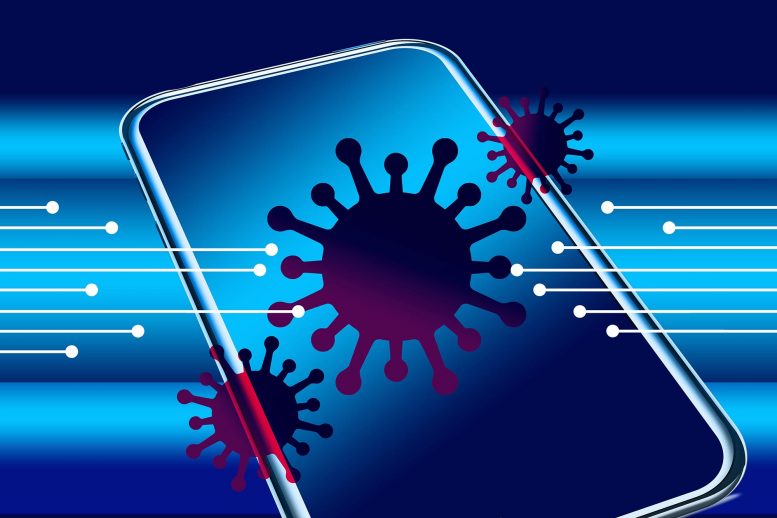
Contract tracing apps used to reduce the spread of COVID-19 are unlikely to be effective without proper uptake and support from concurrent control measures, finds a new study by UCL researchers.
The systematic review*, published in Lancet Digital Health, shows that evidence around the effectiveness of automated contact tracing systems is currently very limited, and large-scale manual contact tracing alongside other public health control measures – such as physical distancing and closure of indoor spaces such as pubs – is likely to be required in conjunction with automated approaches.
The team found 15 relevant studies by reviewing more than 4,000 papers on automated and partially-automated contact tracing, and analyzed these to understand the potential impact these tools could have in controlling the COVID-19 pandemic.
Lead author Dr. Isobel Braithwaite (UCL Institute of Health Informatics) said: “Across a number of modeling studies, we found a consistent picture that although automated contact tracing could support manual contact tracing, the systems will require large-scale uptake by the population and strict adherence to quarantine advice by contacts notified to have a significant impact on reducing transmission.”
The authors suggest that even under optimistic assumptions – where 75-80% of UK smartphone owners are using a contact tracing app, and 90-100% of identified potential close contacts initially adhere to quarantine advice – automated contact tracing methods would still need to be used within an integrated public health response to prevent exponential growth of the epidemic.
In total, 4,033 papers published between January 1, 2000 and April 14, 2020 were reviewed, which allowed researchers to identify 15 papers with useful data. The seven studies that addressed automated contact tracing directly were modeling studies that all focused on COVID-19. Five studies of partially-automated contact tracing were descriptive observational studies or case studies, and three studies of automated contact detection looked at a similar disease context to COVID-19, but did not include subsequent tracing or contact notification.
Partially-automated systems may have some automated processes, for instance in determining the duration of follow-up of contacts required, but do not use proximity of smartphones as a proxy for contact with an infected person.
Analysis of automated contact tracing apps generally suggested that high population uptake of relevant apps is required alongside other control measures, while partially-automated systems often had better follow-up and slightly more timely intervention.
Dr. Braithwaite said: “Although automated contact tracing shows some promise in helping reduce transmission of COVID-19 within communities, our research highlighted the urgent need for further evaluation of these apps within public health practice, as none of the studies we found provided real-world evidence of their effectiveness, and to improve our understanding of how they could support manual contact tracing systems.”
The review shows that, at present, there is insufficient evidence to justify reliance on automated contact tracing approaches without additional extensive public health control measures.
Dr. Robert Aldridge (UCL Institute of Health Informatics) added: “We currently do not have good evidence about whether a notification from a smartphone app is as effective in breaking chains of transmission by giving advice to isolate due to contact with a case of COVID-19 when compared to advice provided by a public health contact tracer. We urgently need to study this evidence gap and examine how automated approaches can be integrated with existing contact tracing and disease control strategies, and generate evidence on whether these new digital approaches are cost-effective and equitable.”
If implemented effectively and quarantine advice is adhered to appropriately, automated contact tracing may offer benefits such as reducing reliance on human recall of close contacts, which could enable identification of additional at-risk individuals, informing potentially affected people in real-time, and saving on resources.
Dr. Braithwaite added: “We should be mindful that automated approaches raise potential privacy and ethics concerns, and also rely on high smartphone ownership, so they may be of very limited value in some countries. Too much reliance on automated contact tracing apps may also increase the risk of COVID-19 for vulnerable and digitally-excluded groups such as older people and people experiencing homelessness.”
If implementing automated contact tracing technology, the authors say that decision-makers should thoroughly assess available evidence around its effectiveness, privacy and equality considerations, monitoring this as the evidence base evolves.
They add that plans to properly integrate contact tracing apps within comprehensive outbreak response strategies are important, and their impacts should be evaluated rigorously. A combination of different approaches is needed to control COVID-19, and the review concludes that contact tracing apps have the potential to support that but they are not a panacea.
This study is co-authored by researchers UCL Public Health Data Science Research Group, Institute of Health Informatics, Department of Applied Health Research, and Collaborative Centre for Inclusion Health.
*A systematic review carefully identifies all the relevant published and unpublished studies, rates them for quality, and synthesizes the studies’ findings across the studies identified.
Reference: “Automated and partly automated contact tracing: a systematic review to inform the control of COVID-19” by Isobel Braithwaite, MBBS; Thomas Callender, MBChB; Miriam Bullock, MSc, and Robert W Aldridge, Ph.D., 19 August 2020, Lancet Digital Health.
DOI: 10.1016/S2589-7500(20)30184-9
Study limitations
As part of this systematic review, researchers did not find any epidemiological studies comparing automated to manual contact tracing systems and their effectiveness in identifying contacts. Other limitations include the lack of eligible empirical studies of fully-automated contact tracing and a paucity of evidence related to ethical concerns or cost-effectiveness.
1 Comment
Nice. Now the big companies know exactly what you are doing every time, and can make huge $$ by selling the info and get ad recommendations improved. Tracing the virus is just a side product